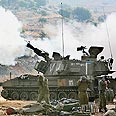
IDF forces in north
צילום: רויטרס
UN: Israel cluster bomb use in Lebanon ‘outrageous’
Organization’s humanitarian coordinator in Lebanon says ‘most bomblets were fired by the time the conflict had been largely resolved in the form of Resolution 1701’; adds: it seems to me extraordinary that they were fired off in the last hours of the war into areas where civilian populations were known to be going
A UN official said on Tuesday that Israel dropped at least 350,000 cluster bomblets on south Lebanon in its war with Hizbullah guerrillas, mostly when the conflict was all but over, leaving a deadly legacy for civilians,.
“The outrageous fact is that nearly all of these munitions were fired in the last three to four days of the war,” David Shearer, the United Nations humanitarian coordinator in Lebanon, told a news conference in Beirut.
“Outrageous because by that stage the conflict had been largely resolved in the form of (UN Security Council) Resolution 1701,” he said.
The resolution adopted on Aug. 11 halted 34 days of fighting three days later. A truce has largely held since then.
Israel denies using cluster bombs illegally.
Shearer said Israel had not explained why it fired so many cluster bombs across the south as the war drew to a close. Nor had it responded to a UN Request for the map coordinates of the cluster bomb strikes to hasten clearance efforts.
UN Emergency Relief Coordinator Jan Egeland has called Israel “Completely immoral” for using them in residential areas.
The United Nations has so far identified 516 cluster bomb strike locations and says 30 to 40 percent of the bomblets they scattered over the south failed to explode at the time.
'It defies belief that this would happen'
Only about 17,000 bomblets have been defused so far and the United Nations says it could take up to 30 months to destroy most of the unexploded sub-munitions. The British-based LandMine Action group has said clearing the south could take a decade.
Shearer said cluster bombs had killed or wounded an average of three people a day since the war ended, with 15 killed, including a child, and 83 wounded, of whom 23 are children.
Clearance efforts have so far focused on villages, schools and playing areas, but will soon shift towards farmland, which provides 70 percent of household incomes in the south, he said.
“The cluster munitions are stopping farmers from getting out to their fields and resuming their farming activities,” he said.
Human rights groups have criticized Israel and Hizbullah for targeting civilians indiscriminately in the war that began after Hizbullah captured two Israeli soldiers on July 12.
“We know these (cluster) munitions have a failure rate and it seems to me extraordinary that they were fired off in the last hours of the war into areas where civilian populations were known to be going,” Shearer said.
“For a humanitarian person, it defies belief that this would happen.”










